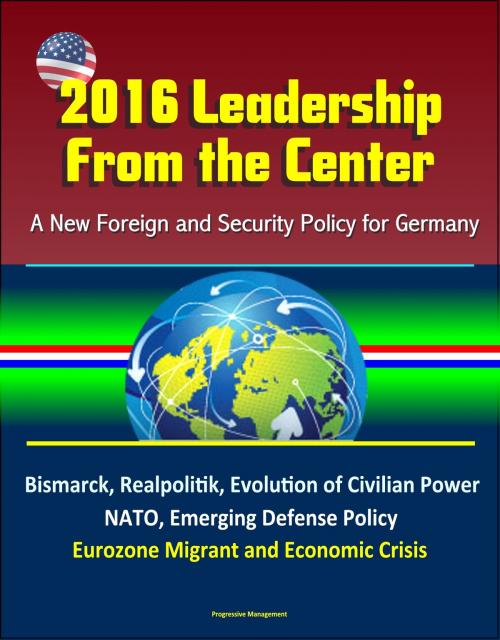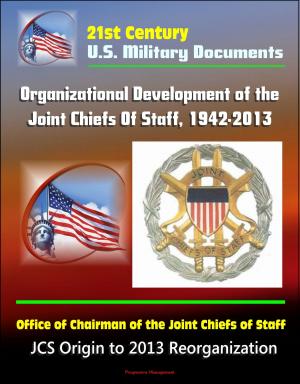2016 Leadership From the Center: A New Foreign and Security Policy for Germany - Bismarck, Realpolitik, Evolution of Civilian Power, NATO, Emerging Defense Policy, Eurozone Migrant and Economic Crisis
Nonfiction, History, Military, Strategy, Germany| Author: | Progressive Management | ISBN: | 9781370549313 |
| Publisher: | Progressive Management | Publication: | October 25, 2016 |
| Imprint: | Smashwords Edition | Language: | English |
| Author: | Progressive Management |
| ISBN: | 9781370549313 |
| Publisher: | Progressive Management |
| Publication: | October 25, 2016 |
| Imprint: | Smashwords Edition |
| Language: | English |
This excellent report has been professionally converted for accurate flowing-text e-book format reproduction. Germany in 2016 finds itself in the midst of a political and diplomatic revolution, the meaning of which is unclear for United States policy other than this process constitutes a break with custom and tradition in statecraft. This study analyzes the evolution of German foreign policy and security policy since revival of statecraft in 1945 and the changes in policy determinants since 1990. This evolution can be separated into phases beginning with the policy of reconciliation associated with the birth of the Federal Republic of Germany in 1949 culminating with the reunification of Germany in 1990. Having achieved the goals of reconciliation—regaining sovereignty, ensuring security, and achieving reunification, the determinants of the security policy shifted as Germany's relative geographic and diplomatic position in Europe shift during NATO and EU expansion. This led to policy eventually evolving into a focused effort towards European integration and ultimately—as the new generation of Germans raised under the peace and economic success after reunification—becoming a civilian power. Emerging from this period, a new Germany confident enough to declare leadership from the centre assumed de facto leadership in the European Union. The dichotomy of Germany's past and ambitions in foreign and security policy and the effects of its shifting geographic position within Europe are the key drivers of foreign policy.
CHAPTER I - INTRODUCTION * A. MAJOR RESEARCH QUESTIONS * B. IMPORTANCE * C. POTENTIAL EXPLANATIONS AND HYPOTHESES * D. RESEARCH DESIGN AND METHODOLOGY * E. THESIS OVERVIEW AND DRAFT CHAPTER OUTLINE * CHAPTER II - THE PRELUDE TO REUNIFICATION: POLICY OF RECONCILIATION * A. BISMARCK AND THE UNIFICATION OF GERMANY * B. INTEGRATION AND MULTILATERALISM FOR SOVEREIGNTY * C. THE REALPOLITIK OF THE POST-WAR ORDER * CHAPTER III - REUNIFICATION AND THE RISE OF THE CIVILIAN POWER * A. THE EVOLUTION OF THE CIVILIAN POWER * B. GERMANY, NATO, AND THE COMMON FOREIGN AND SECURITY POLICY * CHAPTER IV - THE EMERGING GREAT POWER * A. THE COMMON SECURITY AND DEFENSE POLICY * B. THE RISING ECONOMIC POWER * C. ANALYSIS OF THE PRESENT: LEADERSHIP FROM THE CENTRE * CHAPTER V - CONCLUSION * LIST OF REFERENCES * FOOTNOTES
This excellent report has been professionally converted for accurate flowing-text e-book format reproduction. Germany in 2016 finds itself in the midst of a political and diplomatic revolution, the meaning of which is unclear for United States policy other than this process constitutes a break with custom and tradition in statecraft. This study analyzes the evolution of German foreign policy and security policy since revival of statecraft in 1945 and the changes in policy determinants since 1990. This evolution can be separated into phases beginning with the policy of reconciliation associated with the birth of the Federal Republic of Germany in 1949 culminating with the reunification of Germany in 1990. Having achieved the goals of reconciliation—regaining sovereignty, ensuring security, and achieving reunification, the determinants of the security policy shifted as Germany's relative geographic and diplomatic position in Europe shift during NATO and EU expansion. This led to policy eventually evolving into a focused effort towards European integration and ultimately—as the new generation of Germans raised under the peace and economic success after reunification—becoming a civilian power. Emerging from this period, a new Germany confident enough to declare leadership from the centre assumed de facto leadership in the European Union. The dichotomy of Germany's past and ambitions in foreign and security policy and the effects of its shifting geographic position within Europe are the key drivers of foreign policy.
CHAPTER I - INTRODUCTION * A. MAJOR RESEARCH QUESTIONS * B. IMPORTANCE * C. POTENTIAL EXPLANATIONS AND HYPOTHESES * D. RESEARCH DESIGN AND METHODOLOGY * E. THESIS OVERVIEW AND DRAFT CHAPTER OUTLINE * CHAPTER II - THE PRELUDE TO REUNIFICATION: POLICY OF RECONCILIATION * A. BISMARCK AND THE UNIFICATION OF GERMANY * B. INTEGRATION AND MULTILATERALISM FOR SOVEREIGNTY * C. THE REALPOLITIK OF THE POST-WAR ORDER * CHAPTER III - REUNIFICATION AND THE RISE OF THE CIVILIAN POWER * A. THE EVOLUTION OF THE CIVILIAN POWER * B. GERMANY, NATO, AND THE COMMON FOREIGN AND SECURITY POLICY * CHAPTER IV - THE EMERGING GREAT POWER * A. THE COMMON SECURITY AND DEFENSE POLICY * B. THE RISING ECONOMIC POWER * C. ANALYSIS OF THE PRESENT: LEADERSHIP FROM THE CENTRE * CHAPTER V - CONCLUSION * LIST OF REFERENCES * FOOTNOTES















